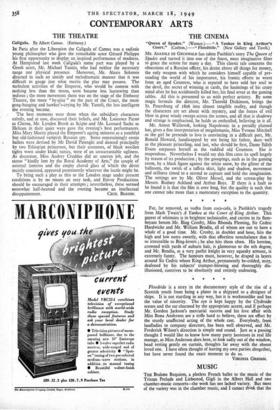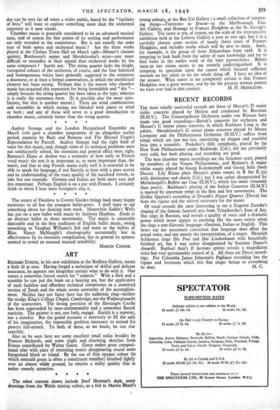MUSIC
THE Brahms Requiem, a plotless French ballet to the music of the Tristan Prelude and Liebestod, Gigli in the Albert Hall and two chamber-music concerts—the week has not lacked variety. But most of the variety was in the chamber music, and I cant: think that the
day can be very far off when a wider public, bored by the "futilities of brio," will want to explore something more than the orchestral repertory as it now stands.
Chamber music is generally considered to be an advanced musical taste, and of course the fine points of its writing and performance are only revealed to the connoisseur. But is not exactly the same true of both opera and orchestral music ? Are the three works played at the Chelsea Town Hall on March 14th—Mozart's clarinet quintet, Beethoven's septet and Mendelssohn's octet—any more difficult or recondite in their appeal than orchestral works by the same composers ? Surely not. The string quartet lacks the bright, variegated colours of the orchestra, of course, and the four balanced and homogeneous voices have generally suggested to the composer a discourse, or at least a formal conversation, in which the intellectual element has been strong. Perhaps that is the reason why chamber music has acquired this reputation for being formidable and " dry "- simply because the string quartet has been taken as the type, whereas it is really the extremest form. (It is possibly also the most satis- factory, but that is another matter.) There are wind combinations and ensembles in which strings are blended with piano or wind or both ; and any of these will serve as a good introduction to chamber music, certainly better than the string quartet.
Audrey Strange and the London Harpsichord Ensemble on March nth gave a chamber programme of an altogether earlier period, cantatas by Bach and Rameau and The Blessed Virgin's Expostulation by Purcell. Audrey Strange had the right kind of voice for this music, and, though some of its technical problems were not satisfactorily solved, the intention and general effect were right. Rameau's Diane et Action was a reminder of how early in French vocal music the text is as important as, or more important than, the music, and that to sing French music really well it is essential to be able to speak the language, if not fluently at least with a pure accent and an understanding of the exact quality of the nasalised vowels, to take but one example. German and Italian are both more easy and less important. Perhaps English is on a par with French. I certainly think so when I hear most foreigners sing it.
* * * * The return of Danilova to Covent Garden brings back many happy memories to all but the youngest ballet-goers. I shall hope to say something about her dancing next week. Meanwhile Sadler's Wells has put on a new ballet with music by Anthony Hopkins. Etude is an abstract ballet in three movements. The music is eminently danceable and in the best traditions of English ballet music, owing something to Vaughan Williams's Job and more to the ballets of Bliss. Nancy McNaught's choreography occasionally lost in effectiveness by its excessive complication, but in general its aptness seemed to reveal an unusual musical sensibility.
MARTIN COOPER.







































 Previous page
Previous page